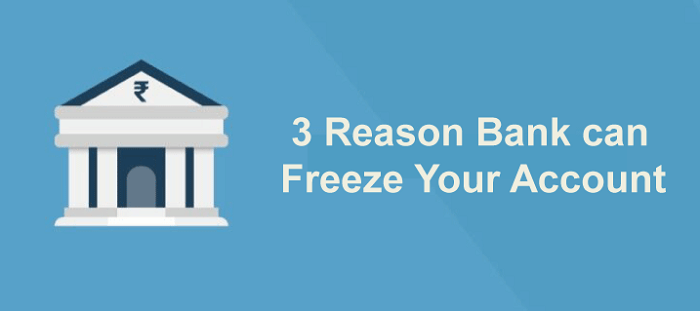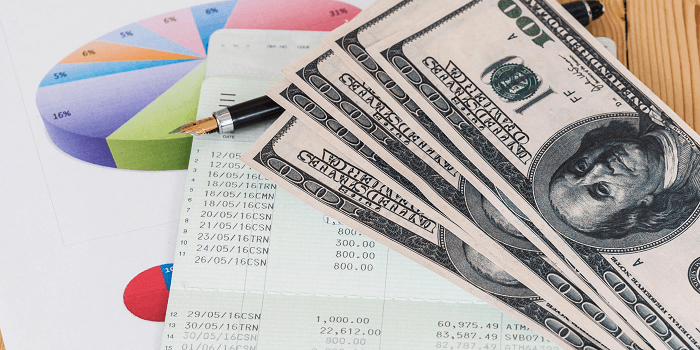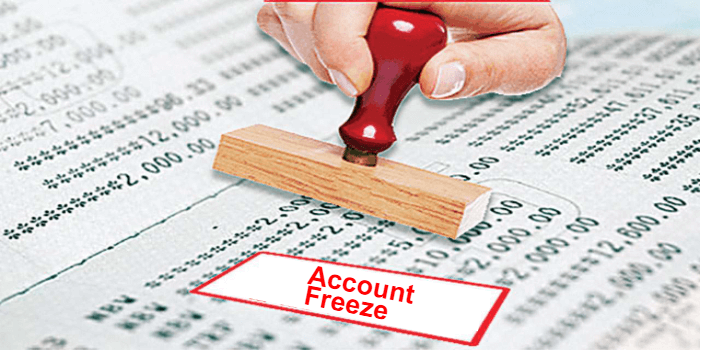3 Reasons Banks Can Freeze Your AccountReceiving a notice that the bank account has been frozen can be frightening irritating, and embarrassing. It's much worse when someone discovers this issue after attempting to use his debit card at the grocery store or while trying to obtain cash for a night out with pals. Bank accounts are frozen for various reasons, each of which necessitates certain activities to be taken to unfreeze them. What exactly is a Frozen Account?An account freeze implies that the bank has prohibited someone from making certain transactions. One can still have access to the account, but the operating options will be limited. In most cases, individuals can still make or receive deposits into their accounts, including paychecks and online deposits. However, the freeze prevents any withdrawal or transfer of funds to another account from taking place. Thus, whatever is deposited into the account during this period remains there. This includes any preauthorized payments one has set up through the checking account. So, if someone has set an automatic rent or mortgage payment, a car loan payment, or a monthly bill for a gym membership, they are unlikely to be processed after the account has frozen. 3 Reasons Banks Can Freeze Your Account
1. Suspicious or Illegal ActivityIf any account seems to have suspicious or illegal activity, a bank is allowed to freeze an account. This is specifically done if the bank believes that one of the account holders has been conducting illegal activities and there may be certain lawful allegations in the future. Bankers have become stricter after the events of September 11, 2001, due to certain criminal enterprises that have used financial institutions to conduct business over the years. It is common for banks to monitor accounts for money laundering anyway, which is when large amounts of money are deposited into bank accounts to seem legitimate. If the banks suspect that the account holder has used the account illegally, they can also close those respective accounts without any notice. It can also prevent account holders from doing any kind of transaction in the future. If, however, someone is not doing an illegal activity, then he/ she should contact the respective bank immediately to clear this up and remove the freeze. 2. Unpaid Debts through CreditorsIf a person has unpaid debts, the creditors can ask the bank to freeze the account. They would then be able to go into the account and pull money to pay off the debt. However, they must first get approval from the courts by getting a judgment against the debtor. The judgment would then be sent to the bank, and they would have this on file. It is also important to be aware that if an individual has a defaulted loan at the same institution as the bank account, the lender can access the account to pay the defaulted loan without obtaining a judgment. It gets agreed upon when signing the agreement for obtaining the loan. 3. Unpaid Debts to the GovernmentIf an individual owes student loans or taxes to the government, he might find his bank account automatically frozen by the Internal Revenue Service (IRS). It can issue a tax levy for any unpaid taxes, which will not be lifted until the debt is fully paid. The government can do a few different things for unpaid student loans. They can either take the tax refund or garnish the wages. Garnishing wages is more common without pursuing a judgment from the courts. 
Even if the bank account is frozen due to debt collectors, it cannot be fully emptied. Depending on the state, some regulations govern how much can be garnished. Furthermore, the type of revenue that can be taken from an individual is limited. For example, creditors are prohibited in some states from taking Social Security benefits, child support, or workers' compensation. When the bank account is frozen, one must file an exemption claim within ten days. How to prevent the bank account from being frozen?One can take precautionary steps to avoid having his bank account frozen or make an attempt to have the funds released if the account has been frozen. To avoid this problem, the following precautionary measures can be taken: Pay Attention to Debt CollectorIf someone wants to avoid having his bank accounts frozen, it is important to always respond to debt collectors. If possible, the goal must be to pay off the debts timely, but if this is not possible, one can attempt to settle the debt by contacting the collectors. Usually, one would settle the debt by paying a lump sum for less than owed or agreeing to a new payment plan. In many cases, especially government entities, if one asks for the attachment to be released after scheduling a payment plan, they will comply. One can always contact the creditors to see if they can make a deal. Direct Deposit of all Government Assistance FundsLaws in place require banks to review anyone subject to a frozen account. If government benefits, such as social security, are deposited directly into the account, that money cannot be frozen. Additionally, any money from the benefits deposited two months before the garnishment cannot be frozen either. The bank must ensure that a person has at least two months' worth of Social Security benefits in the account available. The only exception is for past-due child support and federal taxes. If someone's Social Security deposits are mixed in with other funds, or he has more than two months of deposits in the same account, some of the funds can be frozen. Claim ExemptionsSome funds are exempt from being frozen due to specific state laws. If these funds are frozen, one can file a paper with the court explaining the exemption and why he believes that he qualifies. One will also need to request a court hearing to ask him to lift the freeze on the funds frozen in the account. Funds that are exempt from garnishment include the following:
What does account freeze mean for someone?As noted above, a frozen account means one will not have access to the money until the problem is resolved. An individual can't take out cash, and scheduled payments won't go through. And because these payments will bounce, users of these accounts will incur a non-sufficient funds (NSF) charge. If they have money in their account, this will deplete the balance. If not, they will dip into a negative balance putting them into an overdraft. In this case, they must pay additional fees and interest to cover the temporary shortfall. 
When a creditor seeks judgment against an individual, one can expect to see an impact on the credit report as well. The assessment will usually stay on the credit file for seven years for unpaid debts. If the bank suspects that someone is using the account illegally, it can completely close it. This means the respective bank account holder will be left without any money and anywhere to put the paychecks. The person won't be able to do any business with that bank in the future and will have to find another bank. But that's just one outcome. If the bank reports the account activity to authorities, the bank account holder could face fines and/or prosecution. The Bottom LineIf a bank account holder owes money overdue, he/ she may discover that the account has been frozen. This usually occurs only after a creditor or debt collector to whom the account holder owes money obtains a default judgment against him (account holder). If the situation has progressed this far, a creditor or debt collector may be granted a bank account levy, attachment, or garnishment. This enables the creditor to receive funds from the account to pay off due obligations. Furthermore, it also means that the account holder cannot access the account while it is frozen. In such a case, the outstanding checks will not clear, and the account holder will be unable to make transfers. He may also incur fines for insufficient cash in the respective account if he attempts to do any of these activities. One can take precautionary steps to avoid having his bank account frozen or to try to request to get his funds freed by submitting required documents or clarification after the account has been frozen. Knowing why the account has been frozen and how to unfreeze it may be critical to one's financial condition.
Next TopicAccounting Method
|
 For Videos Join Our Youtube Channel: Join Now
For Videos Join Our Youtube Channel: Join Now
Feedback
- Send your Feedback to [email protected]
Help Others, Please Share









